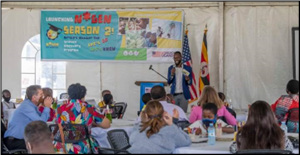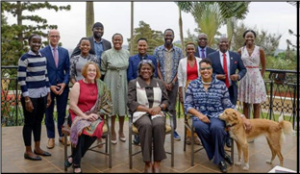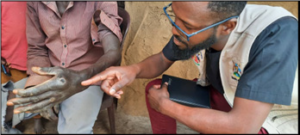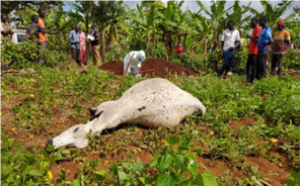 |
Shaban SenyangeBsc. Wildlife Health and management, Msc. Safety, Health and Environment Host Site: Department of Integrated Epidemiology, Surveillance & Public health emergencies
|
||||
ABOUT THE FELLOWShaban Senyange, self-proclaimed #Nature-Boy is an Award-winning Wildlife Health and Conservation Media Specialist. He holds a master’s degree in Occupational Health, Safety and Environment with a background in Wildlife Health and Management. Before joining the fellowship, Shaban paired his dedication towards wildlife conservation and passion for media to create TV Show “ECO-ZONE” that seeks to create awareness about wildlife conservation through travel, and worked with several organizations at the forefront of biodiversity and environmental conservation. Shaban has a keen interest in the human-wildlife, particularly the implementation of the One Health approach to public health. During the two-year training in service fellowship, Shaban has grown an appreciation of the importance of several statistical methods and research designs in field epidemiology and public health interventions. He has gained vast knowledge and skills and hands on experience in outbreak investigations, emergency preparedness and response, project management and planning, public health surveillance, scientific writing, large database management and analysis, presentation and public speaking skills, leadership skills and capacity building. Additionally, Shaban is particularly proud of the improvement in his research skills, and data analysis (Epi Info and STATA) and GIS mapping. Shaban led 2 outbreak investigation and participated in 9 other outbreaks and public health emergencies. He implemented several projects including a quality improvement project, an HIV project, a descriptive analysis of surveillance data, and an epidemiological study, among others. He has published newspaper articles, published a bulletin article and written manuscripts. Achievements at the Host SiteI was attached to the Department of Integrated Epidemiology, Surveillance and Public Health Emergencies, Ministry of Health. I worked within the department to support surveillance, preparedness, detection and response to priority diseases, conditions and events in the country. In addition, offered support to improve IHR/IDSR capacity including disease reporting mechanisms, participate in timely investigation of disease outbreaks and a number of projects and activities including but not limited to:
Fellowship program specific achievements
Conference presentation
Written communication
Summary of Epidemiological Study:Title: Knowledge, Attitudes and Practices regarding Anthrax among affected communities in Kazo District, Southern Uganda, May, 2022 Background Background:Despite health education about the risks of anthrax from eating meat from carcasses, some districts in Uganda, including Kazo District, experience repeated anthrax outbreaks associated with this risk factor. We assessed knowledge, attitudes, and practices (KAP) around anthrax in previously-affected communities in Kazo District. Methods: We conducted a mixed-methods study in six villages in Kazo District from May 23–June 4, 2022. We administered structured questionnaires to 200 systematically-sampled community respondents aged ≥18 years about anthrax-related KAP and experiences with livestock loss. We conducted three KAP-based focus group discussions with community members identified as anthrax case-patients in previous outbreaks and those whose animals died suddenly in the previous year. We assessed overall knowledge through a set of eight questions on anthrax; species affected, signs and symptoms, transmission and prevention in humans and animals. We scored participants’ responses to KAP questions as “1” (correct) or “0” (incorrect); adequate knowledge score was ≥4. Qualitative data were analyzed using content analysis. Results: Among respondents, 65% were female; mean age was 45 years. In total, 94% had heard of anthrax and 73% knew transmission could occur through eating meat from carcasses. Overall, 77% of respondents had adequate knowledge about anthrax. Only 16% had lost their livestock suddenly in the last year; of these, 21% consumed the meat and 53% buried the carcasses. Qualitative data indicated that farmers did not vaccinate livestock against anthrax due to cost and difficulty accessing vaccine and veterinary services. Poverty and limited access to protein were cited as drivers for consuming meat from carcasses despite the risk. Conclusion: Good awareness about anthrax among residents of a repeatedly-affected community in Uganda did not translate to safe practices. Alternative preventive approaches, such as compensating farmers for anthrax-positive carcasses in exchange for permitting safe animal disposal, might reduce risk in high-risk communities. Key words: Anthrax, Knowledge-attitude-practice, Kazo District, Uganda Key lessons learnt during the fellowshipPHFP has presented an opportunity to gain hands-on learning experience in field epidemiology and public health leadership with the skills and competencies acquired from this practical experience and mentorship
Next Steps
Pictorial
|
|||||
Sign in
Sign in
Recover your password.
A password will be e-mailed to you.




